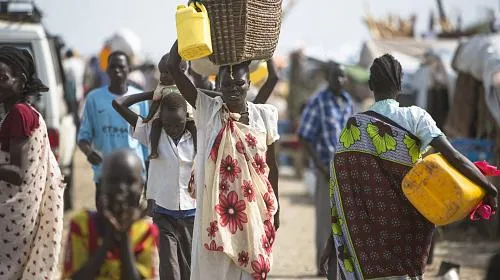International agencies issue grave warning ahead of crucial donor conference for South Sudan, stating millions of people risk plunging deeper into crisis if urgent funding is not delivered.
GENEVA-(June 16, 2015)–Donors attending Tuesday’s Geneva pledging conference for South Sudan should address a massive funding shortfall– more than $1.1 billion of the humanitarian response- in order to avert immense suffering for millions of people, humanitarian agencies said today.
Two hundred million dollars out of the $529 million that was pledged at a similar conference in Nairobi in February 2015 is yet to reach the people who desperately need it.
Almost 8 million (7.9m) people in South Sudan are hungry now and aid agencies – CARE, International Rescue Committee, Oxfam, Mercy Corp, Danish Refugee Council, Norwegian Refugee Council, CAFOD and Christian Aid – warn that hundreds of thousands of South Sudanese could lose access to often life-saving assistance if donors do not deliver on their previous commitments, and also quickly disburse new funding.
“The hunger season is starting now. Governments can make a difference by committing urgent funding for emergency needs to save thousands of lives and prevent further suffering for millions of South Sudanese. Families need help now,” said Zlatko Gegic, Country Director for Oxfam in South Sudan.
Collectively, the eight agencies require $123 million to reach 3.8 million people with assistance by the end of December 2015. So far, they have a budget shortfall of $39.4 million.
“While needs have risen dramatically, funding hasn’t. Those who need help the most, particularly in remote communities- many of them cut off by fighting – may also end up being cut off from humanitarian aid,” said Aimee Ansari, Country Director for CARE South Sudan.
Ronald-Paul Veilleux, Country Director for International Rescue Committee said: “Hundreds of thousands of children are malnourished, at risk of disease and death, yet they are the future doctors, lawyers, civil servants and community leaders of South Sudan. Not getting aid to them in time further undermines the development potential of this nation.”
Mohammed Qazilbash, Country Director for Mercy Corps in South Sudan said: “Our organizations have helped millions of South Sudanese access food, clean water, medicine, education, livelihood support and protection. However, if donors continue to delay, South Sudanese may plunge back into crisis.”
Increased fighting in Unity and Upper Nile states has forced our agencies to suspend activities and in some cases relocate staff, leaving thousands of people vulnerable.
Jane Andanje, Country Director for CAFOD Trócaire said: “Recent violence has driven civilians further away from assistance. Aid supplies have also been looted. Delayed funding sets back the resumption of response activities meaning vulnerable communities lack help at a time they need it the most.”
Notes to Editors:
THE FOLLOWING IS A JOINT STATEMENT FROM THE SIGNING AGENCIES.
Our organizations condemn in the strongest terms the appalling increase in violence in Unity and Upper Nile States. The UN reports that civilians are being raped, killed and children forcibly recruited. Even those who manage to escape are being driven deeper into the bush or are hiding in swamps and islands, further cut off from aid.
The UN Mission in South Sudan mandated with protecting civilians must continue to give sanctuary to those fleeing violence and increase regular patrols where civilians are at high risk.
Donors must maintain and support long-term development programs to protect hard-won gains and ensure people in less conflict-affected areas continue to have improved access to food and diversified livelihood opportunities.
South Sudanese continue to seek refuge in neighboring countries such as Kenya, Ethiopia, Uganda and Sudan with 60,000 fleeing this year alone. Donors must urgently deliver funds to provide aid to the over half a million South Sudanese refugees in the region.
Regional and international governments should increase pressure on the warring parties to allow people to leave areas of conflict and access aid safely. All acts of sexual violence must end.
We continue to appeal to the warring parties to lay down their arms, urgently reinvigorate the peace process and ensure a lasting, inclusive peace deal is forged to avert further suffering for the people of South Sudan.
Over two million people have been forced from their homes, including 135,000 who are living in UN bases across the country and over 500,000 in neighboring countries.
By the end of July, the Food and Agricultural Organization (FAO) predicts that 40% of South Sudan’s total population (4.6 million) will be severely food insecure. Food prices have shot up by a massive 40% between January and April this year.
The UN has estimated that to fully meet the needs of South Sudanese affected by the crisis, $ 1.63 billion is needed. Only 36% of the response has been funded to date. The South Sudanese regional refugee response is only 11% funded.
Media Contact: Holly Frew hfrew@care.org +1.404.979.9389

